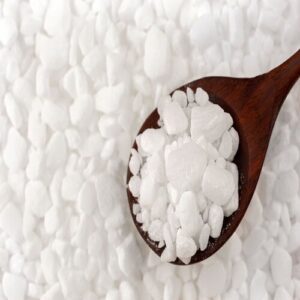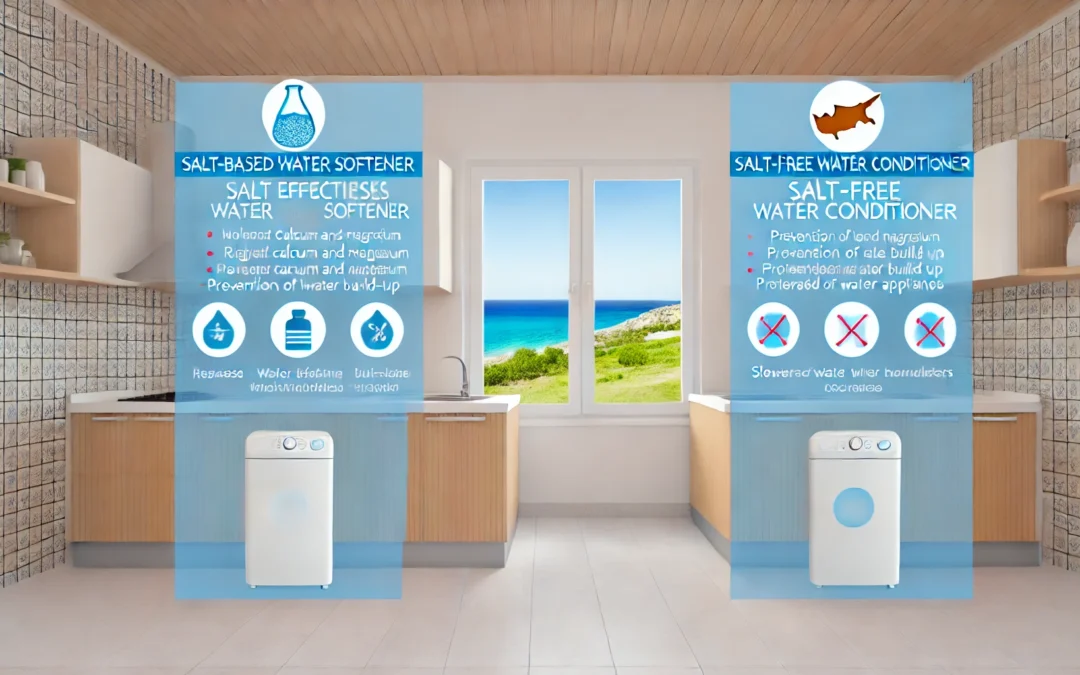Introduction to water treatment in Cyprus
Hey there, fellow Cypriots! Are you tired of dealing with hard water? You’re not alone. Many of us across the island struggle with this pesky problem. But don’t worry, we’ve got solutions!
Today, we’re going to chat about two popular ways to tackle hard water: salt softeners and whole house water conditioners. By the end of this article, you’ll be a water treatment expert! Well, maybe not an expert, but you’ll definitely know enough to impress your neighbors at the next village barbecue.
Understanding hard water in Cyprus
Before we dive in, let’s talk about why we even need these fancy gadgets. Cyprus, our beautiful Mediterranean gem, has some of the hardest water in Europe. But what does that mean?
Hard water is full of minerals like calcium and magnesium. While these are great for your bones, they’re not so great for your pipes, appliances, or skin. Here’s what hard water can do:
- Leave spots on your dishes and glasses
- Make your hair feel dry and brittle
- Cause soap scum buildup in your shower
- Reduce the lifespan of your appliances
Sound familiar? If you’re nodding your head, you’re probably dealing with hard water. But don’t worry, we’re about to explore two solutions that can make your life a whole lot easier.
Salt softeners: The old reliable
Let’s start with salt softeners. These have been around for ages and are a popular choice for many Cypriot homes. At WaterFilterNet.com, we offer a range of top-quality water softeners designed specifically for Cyprus’ hard water conditions.
How salt softeners work
Salt softeners use a process called ion exchange. It’s like a swap meet for your water. The softener trades the hard minerals in your water for sodium ions. The result? Soft water that’s easier on your pipes, appliances, and skin.
Benefits of salt softeners
Here’s why many people love their salt softeners:
- They’re effective at removing hard minerals
- They can help extend the life of your appliances
- Your soap and shampoo will lather better
- Your skin and hair might feel softer
Introducing the Ecosoft Water Softener 30 Litres

One of our best-selling products is the Ecosoft Water Softener 30 Litres. This compact powerhouse is perfect for Cypriot homes, offering:
- Efficient hard water treatment
- Compact design for easy installation
- Low salt and water consumption
- User-friendly digital control
- Perfect for families of 2-4 people
Drawbacks of salt softeners
But it’s not all sunshine and roses. Salt softeners have some downsides:
- They add sodium to your water, which some people prefer to avoid
- You need to regularly buy and add salt
- They can be less environmentally friendly due to the salt discharge
Whole house water conditioners: The new kid on the block
Now, let’s talk about whole house water conditioners. These are becoming more popular in Cyprus, especially for those looking for a salt-free option.
How whole house water conditioners work
Unlike salt softeners, water conditioners don’t remove minerals from your water. Instead, they change the structure of the minerals so they don’t stick to surfaces. It’s like giving the minerals a new outfit so they behave differently!
Benefits of water conditioners
Water conditioners have some pretty cool perks:
- They don’t add sodium to your water
- There’s no need to buy and add salt
- They’re generally more environmentally friendly
- They can still help protect your appliances and pipes
Drawbacks of water conditioners
But they’re not perfect either:
- They don’t actually remove minerals from the water
- Some people feel the water doesn’t feel as “soft” as with a salt softener
- They can be more expensive upfront
To help you better understand the differences between these two systems, let’s take a look at this side-by-side comparison:
[Insert table here]
As you can see, both systems have their strengths and weaknesses. However, for many homes in Cyprus, salt-based softeners often come out on top. Here’s why:
Why salt-based water softeners are better for Cyprus
Given the unique water conditions in Cyprus, salt-based water softeners often come out on top. Here’s why:
- Extreme hardness levels: Cyprus has some of the hardest water in Europe. Salt-based softeners are more effective at tackling these high mineral concentrations.
- Complete mineral removal: Unlike conditioners, salt-based softeners actually remove the hard minerals. This is crucial for protecting appliances and plumbing in Cypriot homes.
- Noticeable difference: With our very hard water, you’ll likely feel a more significant improvement in water quality with a salt-based system.
- Appliance protection: Salt-based softeners can significantly extend the life of water heaters, washing machines, and other appliances – a big plus in our hard water conditions.
- Soap efficiency: You’ll use less soap and detergent with truly softened water, which can lead to cost savings over time.
- Proven track record: Salt-based systems have been used effectively in Cyprus for years, with a proven ability to handle our specific water challenges.
While salt-free systems have their place, for many Cyprus homes, a salt-based softener is often the most effective solution for tackling our extremely hard water. Learn more about how water softeners can solve your hard water problems.
Comparison: Salt-Based Softeners vs. Salt-Free Conditioners
| Feature | Salt-Based Softeners | Salt-Free Conditioners |
|---|---|---|
| Mineral Removal | Yes, removes minerals | No, alters mineral structure |
| Effectiveness in Cyprus | Highly effective for very hard water | Moderately effective |
| Maintenance | Regular salt refills, occasional cleaning | Minimal, occasional filter replacement |
| Environmental Impact | Higher due to salt discharge | Lower, no salt discharge |
| Initial Cost | Often lower | Often higher |
| Ongoing Costs | Salt purchases | Minimal |
| Water Feel | “Slippery” soft water feel | Less noticeable change in feel |
| Appliance Protection | Excellent | Good |
| Sodium Addition to Water | Yes | No |
| Best For | Homes with very hard water, those who want traditional soft water | Environmentally conscious, those avoiding sodium, low maintenance preference |
Choosing the right solution for your Cyprus home
So, which one should you choose? Well, it depends on your specific needs and preferences. Let’s break it down:
Consider a salt softener if:
- You want the “slippery” feel of traditional soft water
- You don’t mind adding salt regularly
- You’re okay with a bit of sodium in your water
- You have very hard water (common in Cyprus)
Consider a water conditioner if:
- You want to avoid adding sodium to your water
- You prefer a low-maintenance option
- You’re environmentally conscious
- Your water isn’t extremely hard
Making the switch: What to expect
Whichever option you choose, you’re in for a treat. Here’s what you might notice after installing your new water treatment system:
- Softer skin and hair
- Cleaner dishes and glasses
- Longer-lasting appliances
- Less soap scum and limescale buildup
But remember, patience is key. It might take a few days or even weeks to see the full benefits. Rome wasn’t built in a day, and your pipes didn’t get gunked up overnight either!
Maintenance tips for your new system
 To keep your new water treatment system running smoothly, here are a few tips:
To keep your new water treatment system running smoothly, here are a few tips:
- For salt softeners:
- Check salt levels regularly
- Clean the brine tank annually
- Schedule professional maintenance every 3-5 years
- For water conditioners:
- Flush the system occasionally as per manufacturer instructions
- Replace filters as recommended
- Have a professional check-up every few years
For more detailed maintenance advice, check out our guide on home water softener benefits and installation.
The environmental impact: A Cyprus perspective
As islanders, we know how precious our natural resources are. That’s why it’s important to consider the environmental impact of our water treatment choices.
Salt softeners, while effective, can increase salt levels in our wastewater. This can be a concern, especially in coastal areas. On the other hand, water conditioners have a lower environmental impact but may not provide the same level of softening.
Cost considerations for Cypriot households
We know that cost is a big factor for many Cypriot families. Let’s break down the costs:
Initial costs
Salt softeners are often cheaper upfront, but remember to factor in installation costs. Water conditioners can be pricier initially, but they might save you money in the long run.
Ongoing costs
With salt softeners, you’ll need to budget for regular salt purchases. Water conditioners don’t require salt, but they might need filter replacements.
Long-term savings
Both systems can help you save on:
- Appliance replacements
- Plumbing repairs
- Cleaning products
For a detailed cost comparison, check out our article on home water treatment systems vs. bottled water.
Conclusion: Your path to better water in Cyprus
Whether you choose a salt softener or a whole house water conditioner, the most important thing is taking that first step towards better water. Your pipes, appliances, skin, and hair will thank you!
Let’s recap the key points:
- Salt softeners remove hard minerals through ion exchange
- Water conditioners alter mineral structure without removing them
- Both options can improve water quality and protect your home
- The best choice depends on your specific needs and preferences
- Salt-based softeners are often more effective for Cyprus’ extremely hard water
- The Ecosoft Water Softener 30 Litres is an excellent choice for many Cypriot homes
Ready to transform your water? We’re here to help! Visit WaterFilterNet.com to explore our products, including the Ecosoft Water Softener 30 Litres, or give us a call to chat with one of our water treatment experts. Don’t forget to share this article with your friends and family – because everyone deserves great water!
Take the plunge into better water today. Your future self (and your shiny, scale-free kettle) will thank you!
- How do you use SodaStream Duo – Step by Step Guide? - February 6, 2024
- Why Choose Tankless Systems? Discover the Best Tankless Reverse Osmosis Systems in Cyprus - December 18, 2023
- Comparison of Chlorine vs Chlorine Dioxide: Which is the Superior Sanitizer? - June 25, 2023

